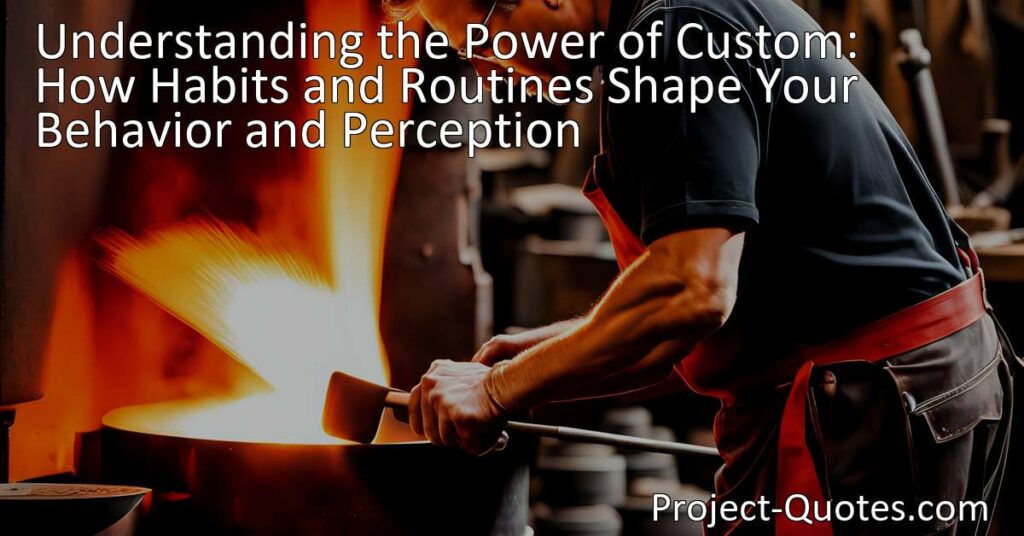Custom is second nature.
Saint Aurelius Augustine
In “Understanding the Power of Custom: How Habits and Routines Shape Your Behavior and Perception,” we explore how customs have the ability to shape our behavior and perception of the world. From personal routines to societal norms, customs significantly impact our lives. By critically analyzing customs and being open to change, we can create a more inclusive and adaptable society.
Table of Contents
Meaning of Quote – Custom is second nature.
Hello there! Today, we will delve into the intriguing concept behind the quote “Custom is second nature.” At first glance, this quote may seem puzzling, but upon further reflection, it offers valuable insights into how our habits and routines shape our behavior and perception of the world around us.
To truly understand this quote, let’s break it down into its two parts. First, we have the word “custom,” which refers to the habitual practice or behavior that individuals develop over time. It encompasses the routines, traditions, and societal norms that we become accustomed to. On the other hand, “second nature” implies that these customs become so deeply ingrained within us that they become instinctual, just like our inherent human nature.
From a young age, we are bombarded with various customs and traditions. These begin in our homes, where we learn routines such as brushing our teeth, making our beds, or eating meals at specific times. As we grow older, we adapt to societal customs such as saying “please” and “thank you,” adhering to cultural norms, or following certain traditions unique to our families or communities.
As customs become a regular part of our lives, they shape our behavior and perception of what is considered “normal.” For example, imagine growing up in a family where punctuality is highly valued. Over time, being on time becomes second nature to you, and you may feel uncomfortable or anxious when you arrive late to an event. This habitual behavior embedded through custom illustrates how our actions become instinctual responses driven by the customs we follow.
Moreover, customs extend beyond personal routines and are deeply ingrained within society. They form the foundation of cultural identity, providing a sense of belonging and unity. Customs reflect shared values, beliefs, and ideals, which guide individuals and communities in their interactions and decision-making processes.
Take, for instance, cultural celebrations like Thanksgiving or Diwali. These customs bring people together, allowing them to bond over shared experiences, food, and traditions. They foster a sense of unity and community, creating lasting memories and reinforcing the importance of cultural heritage.
Furthermore, customs shape our understanding of the world and influence our perceptions. Think about stereotypes, which are preconceived notions about certain groups of people. Stereotypes are often a product of generalizations, ones that can lead to biases and misconceptions. These biases are learned through social customs and can be challenging to unlearn as they have become second nature to many.
For instance, if one grows up in a society where a particular group is constantly portrayed negatively in media, they might develop biased views towards that group without even realizing it. Breaking free from such biases requires critical thinking and questioning the customs and norms imposed by society.
Although customs play a significant role in shaping our behavior and perceptions, it is essential to understand their influence and evaluate when they need adaptation or change. Blindly following customs without questioning their values or impact can hinder personal growth and hinder societal progress.
When individuals challenge existing customs that may no longer align with evolving values or when they introduce new customs that promote inclusivity, openness, and equality, positive change can take place. By critically analyzing customs, we can create a society that is more tolerant, empathetic, and adaptable to the needs of its members.
Customs are not set in stone; they are ever-evolving. As societies change and adapt, so do customs. New habits and routines emerge while others fade away. In today’s fast-paced and interconnected world, the influences of technology, globalization, and shifting societal norms contribute to the constant redefining of customs.
In conclusion, the quote “Custom is second nature” encapsulates the power that customs hold over our behavior, perception, and understanding of the world. From personal routines to societal norms, customs significantly impact our lives. Whether it is the traditions that bring people together or the biases they unknowingly instill, customs have the ability to shape who we are as individuals and as a society.
While customs undoubtedly provide stability and a sense of belonging, it is vital to question and challenge them when necessary. By doing so, we can create a more inclusive, compassionate, and adaptable society. So, let us embrace the beneficial customs while remaining open to change, for it is through this balance that we can continue to grow as individuals and as a collective community.
I hope this quote inspired image brings you hope and peace. Share it with someone who needs it today!


